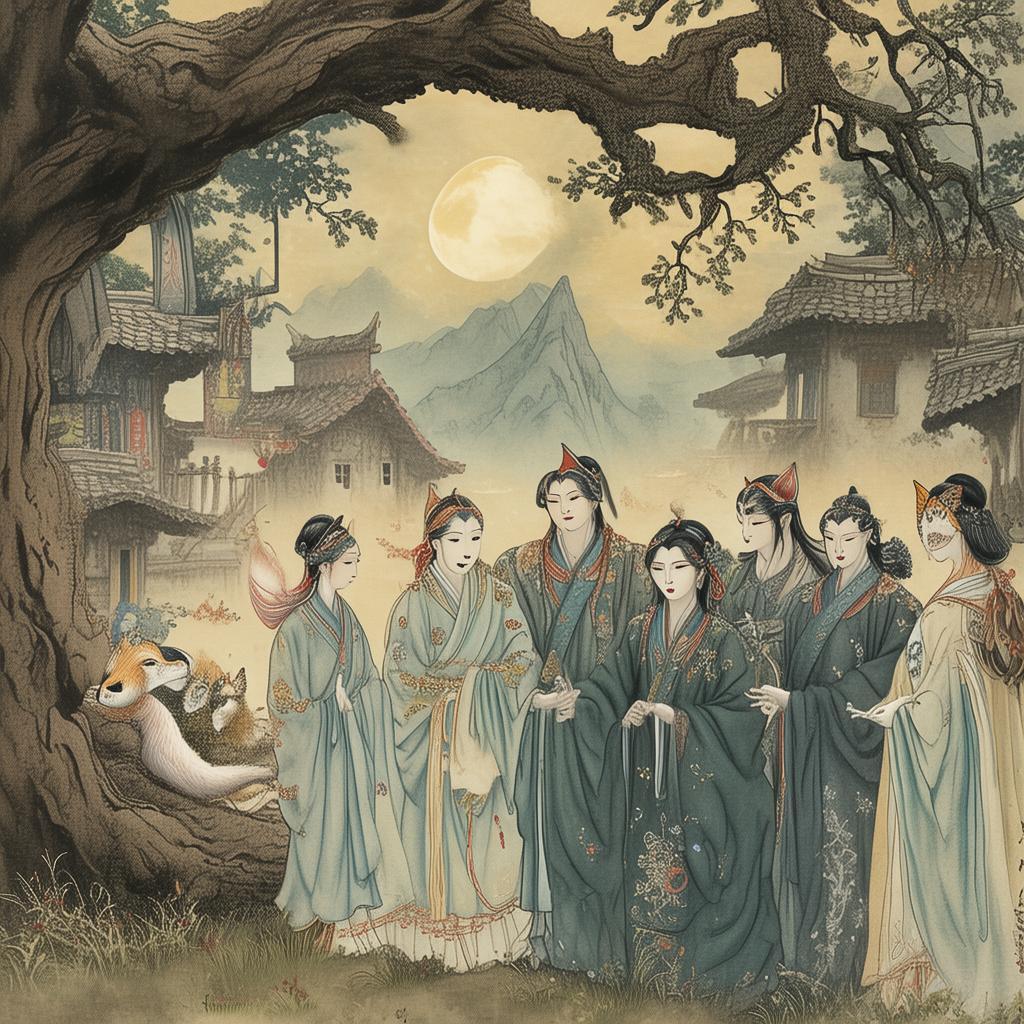Whispers of the Windmill: A Tale of Harmony and Dissonance
In the heart of a small, forgotten village nestled between rolling hills and whispering woods, stood an ancient windmill. It was not just any windmill; it was a sentinel, a guardian of a secret that had been lost to time. The villagers whispered about it, tales of its melancholy songs that only the most attuned ears could hear. The windmill was a relic of a bygone era, its blades creaking with each gust, a reminder of the world's dissonance.
One crisp autumn morning, a young musician named Ling wandered into the village, her heart heavy with the loss of her family. She had traveled far to find solace in the melodies of the world, but the dissonance seemed to echo in her soul. The villagers were surprised to see her, for she was known for her unique ability to hear and compose music that resonated with the natural world.
As Ling approached the windmill, the blades seemed to sing a different tune, one that spoke of sorrow and longing. She felt a strange pull, as if the windmill itself was beckoning her. She climbed the creaky steps, her heart pounding with a mixture of fear and curiosity.
At the top, she found an old, dusty tome bound in leather. The pages were filled with musical notes and cryptic symbols, and it was then that she realized the windmill was no ordinary structure. It was a repository of musical knowledge, a lighthouse in the storm of dissonance.
Ling opened the book and began to read, the notes and symbols dancing before her eyes. She discovered that the windmill was designed to channel the natural harmony of the world into music, a harmony that was lost when humanity's greed and discord overwhelmed the peace of nature.
As she read, the music in the book began to come alive, and she could feel the vibrations of the notes through her fingers. She realized that the key to musical harmony was not just in the composition of music but in understanding and respecting the balance of nature.
Determined to bring harmony back to the world, Ling dedicated herself to learning from the windmill's wisdom. She traveled from village to village, teaching the people the art of harmonizing with the world around them. She showed them how to listen to the whispers of the wind, the songs of the rivers, and the laughter of the birds.
The villagers began to change, their music now a blend of their own voices and the natural world. The dissonance started to fade, replaced by a harmonious symphony that could be heard across the land.
However, not everyone was receptive to Ling's teachings. The rulers of a nearby kingdom, greedy for power and control, saw the windmill and Ling's influence as a threat. They sought to destroy the windmill and silence Ling, believing that their control over the music would give them control over the hearts and minds of the people.
In a dramatic climax, the king's soldiers surrounded the windmill, ready to burn it to the ground. But as they approached, the music of the windmill grew louder, a powerful force that seemed to resist their aggression. Ling, with a heart full of courage and determination, stepped forward.
"Listen to me!" she shouted over the noise. "This is not just music; it is the voice of the earth itself! It speaks of peace, of harmony, and of life. Do you wish to silence it, or do you wish to listen and learn?"

The soldiers stood in awe, the music's power overwhelming their resolve. The king, who had been watching from a distance, stepped forward and addressed Ling.
"Your music has shown me the error of my ways," he said, his voice trembling. "I have sought to control and silence, but now I see that true power lies in understanding and respect."
The king and his soldiers turned away from the windmill, and Ling was able to save it from destruction. The windmill continued to stand as a beacon of musical harmony, and Ling's teachings spread far and wide.
Years passed, and the world began to change. The music of the windmill became a symbol of peace, a reminder that harmony could be found even in the most dissonant of worlds. And so, the windmill's melancholy gave way to a song of hope, a melody that would resonate for generations to come.
The tale of the windmill and Ling became a folk story, passed down through generations, a testament to the power of music and the human spirit's quest for understanding and peace.
✨ Original Statement ✨
All articles published on this website (including but not limited to text, images, videos, and other content) are original or authorized for reposting and are protected by relevant laws. Without the explicit written permission of this website, no individual or organization may copy, modify, repost, or use the content for commercial purposes.
If you need to quote or cooperate, please contact this site for authorization. We reserve the right to pursue legal responsibility for any unauthorized use.
Hereby declared.









